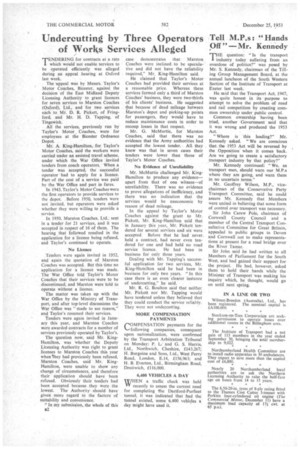Undercutting by Three Operators of Works Services Alleged
Page 28

If you've noticed an error in this article please click here to report it so we can fix it.
TENDERING for contracts at a rate 1 which would not enable services to be operated efficiently was alleged during an appeal hearing at Oxford last week.
The appeal was by Messrs. Taylor's Motor Coaches, Bicester, against the decision of the East Midland Deputy Licensing Authority to grant licences for seven services to Marston Coaches (Oxford), Ltd., and for two services each to Mr. D. R. Pickett, of Fringford, and Mr. H. D. Tapping, of Tingewick.
All the services, previously run by Taylor's Motor Coaches, were for• employees at the Bicester Ordnance Depot.
Mr. A. King-Hamilton, for Taylor's Motor Coaches, said the workers were carried under an assisted travel scheme, under which the War Office invited tenders from coach operators. When a tender was accepted, the successful operator had to apply for a licence. Part of the cost of a service was paid by the War Office and part in fares.
In 1943, Taylor's Motor Coaches were the first operators to provide services to the depot. Before 1950, tenders were not invited, but operators were asked whether they were willing to provide a service.
In 1950, Marston Coaches, Ltd., sent in a tender for 21 services, and it was accepted in respect of 16 of them. The hearing that follotved resulted in the application for a licence being refused, and Taylor's continued to operate.
No Licence Tenders were again invited in 1952, and again the quotation of Marston Coaches was accepted. But this time no application for a licence was made. The War Office told Taylor's Motor Coaches that their services were to be discontinued, and Marston were told to operate without a licence.
The matter was taken up with the War Office by the Ministry of Transport, and after top-level discussions the War Office was "made to see reason," and Taylor's resumed their services.
Tenders were again invited in January this year, and Marston Coaches were awarded contracts for a number of services previously operated by Taylor's.
The question now, said Mr. KingHamilton, was whether the Deputy Licensing Authority was right to grant licenses to Marston Coaches this year when They had previously been refused. Marston Coaches, said Mr. KingHamilton, were unable to show any change of circumstances, and therefore their application should have been refused. Obviously their tenders had been accepted because they were the lowest. The Authority should have given more regard to the factors of suitability and convenience.
"In my submission, the whole of this 112 case demonstrates that Marston Coaches were inclined to be speculative and did not have the reliability required," Mr. King-Hamilton said.
He claimed that Taylor's Motor Coaches had provided their services at a reasonable price. Whereas these services formed only a third of Marston Coaches' business, they were two-thirds of his clients' business. He suggested that because of dead mileage between Marston's depot and picking-up points for passengers, they would have to reduce maintenance costs in order to recoup losses in that respect.
Mr. G. McMurtie, for Marston Coaches, said that there was no evidence that the Army authorities had accepted the lowest tender. All they knew was that in seven cases their tenders were lower than those of Taylor's Motor Coaches.
No Evidence of Unreliability Mr. McMurtie challenged Mr. KingHamilton to produce any evidence— apart from that of one witness—of unreliability. There was no evidence to prove allegations of inefficiency, and there was no indication that the services would be uneconomic by reason of dead mileage.
In the appeal by Taylor's Motor Coaches against the grant to Mr. Pickett, Mr. King-Hamilton said that in January this year, Mr. Pickett tendered for several services and six were accepted. Before that he had never held a contract, had never even tendered for one and had held no road service licence. He had been in business for only three years.
Dealing with Mr. Tapping's successful application for two services, Mr. King-Hamilton said he had been in business for only two years. "In this case there is an even clearer instance Of undercutting," he said.
Mr. R. G. &Dutton said that neither Mr. Pickett nor Mr. Tapping would have tendered unless they believed that they could conduct the service reliably. They were not undercutting.
MORE COMPENSATION PAYMENTS
COMPENSATION payments for the following companies, consequent upon nationalization, were confirmed by the Transport Arbitration Tribunal on Monday; P. L and G. S. Harris, Ltd., Northwich, Cheshire, E143,267; H. Burgoine and Sons, Ltd., West Ferry Road, London, E.14, £156,963; and H. B. Everton, Ltd., Birmingham Road, Droitwich, £116,000.
6,400 VEHICLES A DAY ILIUHEN a traffic check was held VT recently to assess the current need for completing the Dartford-Purfleet tunnel, it was indicated that had the ttnmel existed, some 6,400 vehicles a day might have used it.












































































